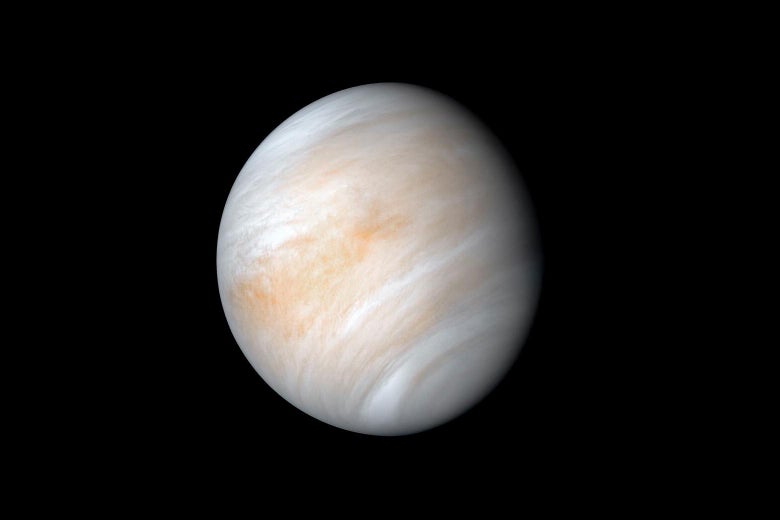The planet shall be house to existence. What occurs to it now?
Portray by NASA/JPL-Caltech
On Monday morning, the field discovered of an intelligent discovery: a whiff of phosphine, one among the universe’s most odious substances, detected within the atmosphere of Venus. On Earth, it hangs out in some unsavory spots, corresponding to sewage vegetation. But it’s furthermore associated to existence, notably with microbes living in anaerobic (oxygen-unfortunate) environments. Could maybe this file of phosphine on Venus furthermore mean that existence exists there?
The reply relies upon on whom you quiz. The one element we now know is that astronomers, as a total, are incapable of any conspiracy to conceal alien existence: Though I tuned into the click conference alongside with many others across the field, the news had already wriggled freed from its press embargo and been on the total identified among house circles for two days. Throughout that time, many folk had been mercurial to grunt that phosphine does occur in places with out existence, particularly gasoline enormous planets like Jupiter and Saturn. Phosphine, an uneasy alliance of a phosphorus atom and three hydrogen atoms, is exhausting to construct and with out complications destroyed; on gasoline giants it’s created deep within the brand new, high stress lower layers of the atmosphere, then dredged upward by flowing currents. Although Venus is no longer any doubt on the brand new aspect as tiny, rocky planets proceed (its moderate temperature is 800 degrees Fahrenheit) it’s quiet gorgeous temperate when compared with Jupiter (which is estimated to be many tens of hundreds of degrees Fahrenheit in its depths!).
But that’s exactly what would construct finding phosphine on Venus intelligent, if the finding holds up: On temperate, terrestrial worlds, phosphine doesn’t discover with out complications, and at the least on Earth, it’s fully chanced on within the presence of existence. For that reason, astronomers like Clara Sousa-Silva (who has the enviable Twitter take care of @DrPhosphine) own suggested that phosphine is a promising biosignature, a chemical tracer that, if chanced on in a terrestrial planet’s atmosphere, would maybe maybe characterize us that existence would maybe maybe also fair be lurking there.
Phosphine is an outmoded buddy of mine—my first-ever compare venture in astronomy titillating finding out phosphine within the atmosphere of Jupiter—but I never imagined I’d be listening to from it again, and completely no longer as a putative biosignature. And on Venus, of all places!
Soon after the announcement, I learn the associated flotilla of scientific compare papers with curiosity, and a wholesome dose of skepticism—detecting phosphine is no longer easy to open with. On high of that, it’s exhausting to know whether phosphine is there because of of existence, or because of there’s only a few attractive non-existence chemistry that we haven’t figured out yet. If there’s phosphine on Venus then that’s positively intelligent, even though it doesn’t stay up being proof of existence. But I’m furthermore no longer willing to bet my dwelling on phosphine being a signal of a microbial Cloud Metropolis.
Once I’d had a big gamble to learn and declare about the outcomes with some fellow astronomer chums, on the opposite hand, my mind turned in diverse places: to stress.
It’s possible you’ll maybe also fair no longer depend on me (or somebody) to stress about a location like Venus. Venus is gorgeous tricky. You don’t hear about Venus rovers because of there aren’t any— in actuality, every mission that’s landed on Venus has been promptly obliterated by its heat and highly acidic, arid ambiance. Designing a mission to preserve out the rest diverse than orbit Venus from a safe distance is like deciding to place your smartphone in a kiln (for science!), but that hasn’t stopped Venus’ followers from trying: missions like NASA’s DAVINCI+ (Deep Ambiance Venus Investigation of Noble gases, Chemistry, and Imaging Plus), India’s Shukrayaan-1, and Russia’s Venera-D all hope to probe Venus’ inhospitable ambiance within the subsequent decade. On high of these nationwide missions, non-public house corporations are furthermore vying to derive in on the act: Peter Beck, CEO of U.S.-basically based mostly Rocket Lab, describes himself as “madly in love with Venus,” and hopes to ship a non-public mission there by 2023.
So why anguish? Finally, in powerful of U.S. science fiction, aliens are the fearsome invaders: They abduct folks and gallop amok destroying buildings. Relying on their whims, they’d maybe also fair either infiltrate the govt., or fair blow it up fully. Paralleling Earthly histories of invasion and colonization, these fictions characterize us to stress the aliens, reflecting white American settler fears that we, too, would maybe maybe also one day be colonized. In accurate-world house exploration, although, we humans are the invaders: As denizens of the fully planet that each person is conscious of positively has existence, we rep sizable be troubled to barely clean our spacecraft so we don’t contaminate the worlds we explore. These regulations, identified as planetary safety, both safeguard Earth’s biosphere from ability contamination and defend diverse worlds from us. Nationwide house companies own adhered carefully to planetary safety ideas, and on the total talking, non-public corporations working below contract with nationwide companies function, too. But non-public endeavors? No longer so powerful: Smartly suited final year the first fully non-public mission to the Moon, Israel’s Beresheet, used to be chanced on to own splattered a cache of hardy organisms identified as tardigrades when it crashed on the lunar ground.
Below contemporary planetary safety ideas, the moon is truly concept to be as a barren desolate tract and thus no longer needing of safety. But if there’s the rest we are able to agree on (besides that astronomers can’t attend secrets), it’s that this ability phosphine detection complicates our suggestions concerning the place existence would maybe maybe also exist beyond Earth. One ability resolution to this new chemical mystery on Venus is to at present pour efforts into going there, leading to a shut to-future “Venus Spin.” But powerful like diverse moments in ancient previous the place now we own rushed forth, humans own the ability to curtail that it is possible you’ll maybe maybe deem of futures, and to make sizable anxiousness, when we bustle.
Planetary safety isn’t fair cleansing a spacecraft, it is miles borne out of a philosophy for how we are able to ethically preserve with diverse worlds. No no longer up to in my case, I’m hopeful— both for phosphine, and for a future the place now we own deeply-concept to be as ethical frameworks for exploration. Within the duration in-between, pleasure and fear will repeatedly proceed hand in hand.
Future Stressful
is a partnership of
Slate,
Fresh The United States, and
Arizona Direct College
that examines rising technologies, public coverage, and society.





Leave a comment
Sign in to post your comment or sign-up if you don't have any account.